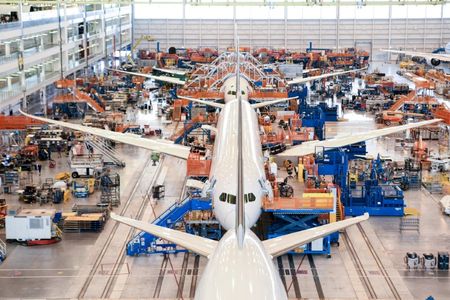By Allison Lampert and David Shepardson
(Reuters) -Boeing expects a slower increase in the production rate and deliveries of its 787 widebody jets as the U.S. planemaker wrestles with supplier shortages “on a few key parts,” an executive on the program told workers on Monday.
Boeing still plans to steadily increase its rate to meet “strong demand,” according to the memo seen by Reuters from Scott Stocker, 787 vice president and general manager, to workers at its South Carolina facility.
“We continue to manage through supplier shortages on a few key parts,” the memo said. “To that end, we have shared with our customers that we expect a slower increase in our rate of production and deliveries.”
Boeing said its 787 production rate was five per month during the last quarter of 2023.
The FAA said it “is aware of Boeing’s challenges obtaining certain parts and is in close communication with the company as it navigates this issue.”
The agency added it is “focused on working with Boeing to ensure only safe and compliant airplanes leave the factory, and the agency retains the authority to issue airworthiness certificates for all Boeing 787s.”
Boeing, which reports earnings on Wednesday, faces scrutiny over the manufacturing of its 777 and 787 widebody jets after company engineer Sam Salehpour spoke out last week at a U.S. Senate hearing.
Salehpour has claimed Boeing failed to adequately shim, or use a thin piece of material to fill tiny gaps in a manufactured product, an omission that could cause premature fatigue failure over time in some areas of the 787 Dreamliner.
The planemaker said there had been no findings of fatigue on its older 787 jets.
Boeing’s separate production of its 737 MAX single-aisle jet in Washington state has fallen sharply as U.S. regulators step up factory checks and workers slow the assembly line outside Seattle to complete outstanding work.
Boeing’s safety culture and manufacturing quality have come under fire following a January mid-air panel blowout on a near-new 737 MAX 9.
Planemakers have broadly been wrestling with shortages of parts and labor due to supply chain snags that have led to delays in deliveries to airlines.
(Reporting By Allison Lampert in Montreal and David Shepardson in Washington; Editing by Jamie Freed and Lincoln Feast.)

